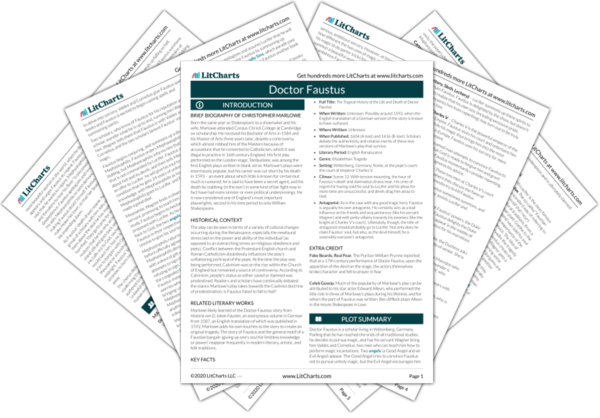Summary
Analysis
Wagner enters and calls out to a Clown, calling him “boy” – which the clown, entering too, takes as an insult. Wagner opines that the poor clown would give the devil his soul for some mutton, and the two trade some wordplay.
While Wagner disliked the scholars' sense of superiority in Scene 2, here he himself uses his knowledge and relative social clout to talk down to the rustic clown.
Themes
Hoping to enlist the clown as his servant, Wagner threatens to turn all of his lice into demons if he doesn't go into service for him for seven years, and he even offers several coins, but the clown refuses.
Like Faustus' bargain with Lucifer, this deal is simply an attempt for one party (Wagner) to exploit the other (the clown).
Themes
Quiz
Test Yourself
Insisting that the clown has no choice, Wagner calls up two devils to prove his point. The clown says he isn't afraid of devils, but when two devils enter, he is terrified. Wagner sends the devils away, and they exit.
Wagner continues to try to exploit the clown through a bad bargain. He uses his knowledge of magic and what little power he has to exert influence over the clown.
Themes
Quiz
Test Yourself
After the devils exit, the clown asks Wagner if while he's in his service he can teach Robin magic. Wagner agrees, but reminds the clown to call him “Master Wagner” and to walk attentively behind him at all times. Thus, they exit.
Wagner seems most concerned with establishing a clear hierarchy, with him as the clown's master. Again, it is his knowledge (of magic spells) that gives him this power over the clown.
Themes
Quiz
Test Yourself
Get the entire Doctor Faustus LitChart as a printable PDF.













